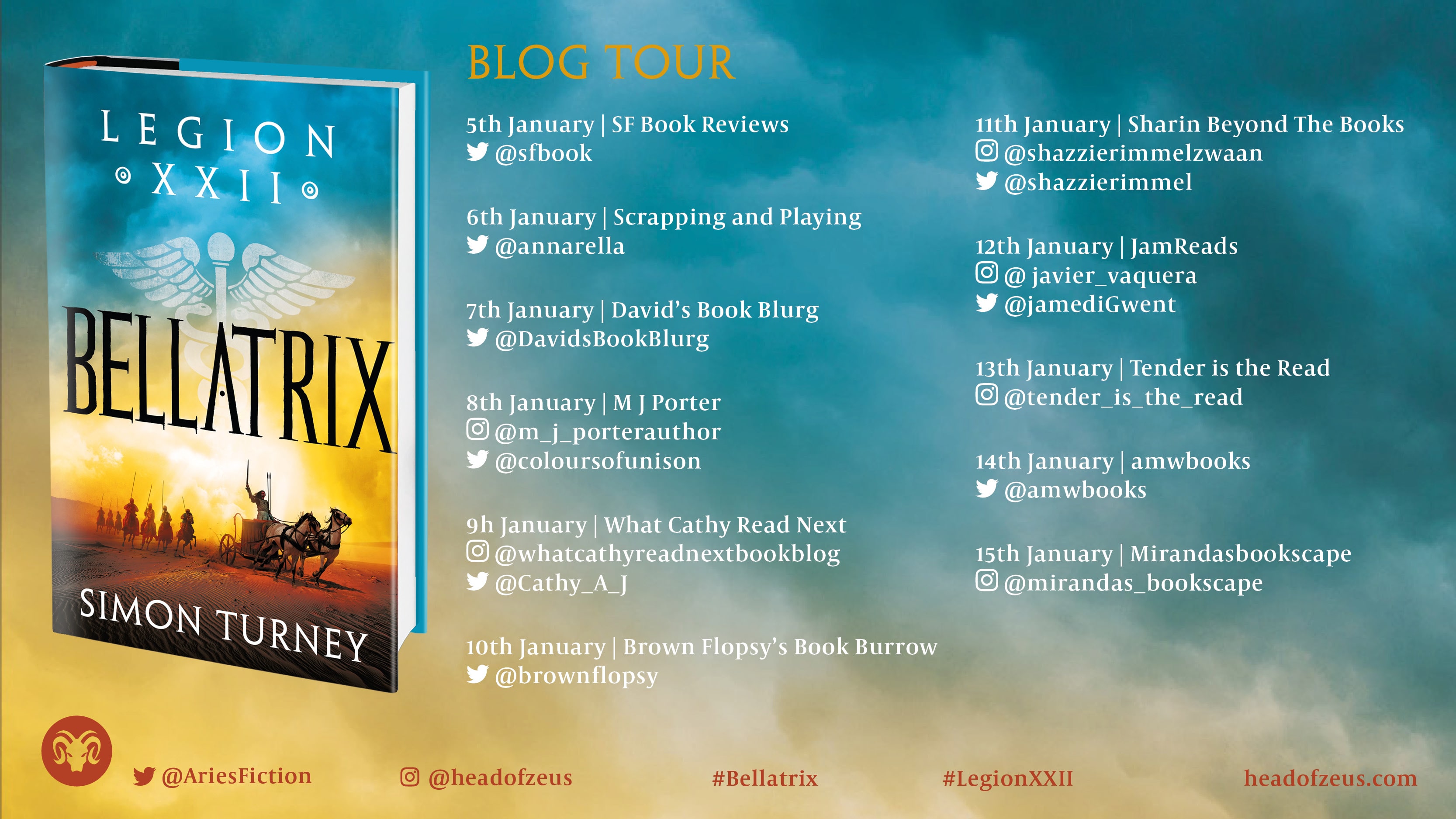Some Thoughts with ... Simon Turney
12 Jan 2023The Author/s

Simon Turney
Simon lives with his wife, children, rabbits and dog in rural North Yorkshire. Having spent much of his childhood visiting historic sites with his grandfather, a local photographer, Simon fell in love with the Roman heritage of the region, beginning with the world famous Hadrian’s Wall. His fascination with the ancient world snowballed from there with great interest in Egypt, Greece and Byzantium, though his focus has always been Rome. A born and bred Yorkshireman with a love of country, history and architecture, Simon spends most of his rare free time travelling the world visiting historic sites, writing, researching the ancient world and reading voraciously.
Simon’s early career meandered along an arcane and eclectic path of everything from the Ministry of Agriculture to computer network management before finally settling back into the ancient world. During those varied years, Simon returned to university study to complete an honours degree in classical history through the Open University. With what spare time he had available and a rekindled love of all things Roman, he set off on an epic journey to turn Caesar’s Gallic War diaries into a novel accessible to all. The first volume of Marius’ Mules was completed in 2003 and has garnered international success, bestseller status and rave reviews, spawning numerous sequels. Marius’ Mules is still one of Simon’s core series and although Roman fiction features highly he now has Byzantine, Fantasy and Medieval series, too, as well as several collaborations and short stories in other genres.
Now, with in excess of 30 novels available and 5 awaiting release, Simon is a prolific writer, spanning genres and eras and releasing novels both independently and through renowned publishers including Canelo and Orion. Simon writes full time and is represented by MMB Creative literary agents.
Look out for Roman military novels featuring Caesar’s Gallic Wars in the form of the bestselling Marius’ Mules series, Roman thrillers in the Praetorian series, set during the troubled reign of Commodus, adventures around the 15th century Mediterranean world in the Ottoman Cycle, a series of Historical Fantasy novels with a Roman flavour called the Tales of the Empire, medieval religious action in the forms of the Knights Templar, and imperial biographies of the Damned Emperors.
The Interview
Welcome to my favourite section of the site, interviews with authors. Today we are accompanied by Simon Turney, a historical fiction author, whose new release, Bellatrix, we are reviewing as part of the book tour with Aries Fiction.
Let's dive in!
1.- What inspired you
to write historical fiction?
I began back in 2003. At
the time, I was reading Julius Caesar’s Commentaries on the Gallic Wars
and was struck, not for the first time, as a historian, by how excellent they are,
and how well-presented and readable even 2000 years on. I also wondered how
many people read them for fun and concluded the answer was ‘not many’. So I
decided to try and turn the first year of Caesar’s diaries into a novel, to see
whether it could be made that little bit more accessible to a modern reader.
That book became Marius’ Mules: The Invasion of Gaul, which spawned a 15-book
series covering the rest of Caesar’s career and writings, and which ends this
spring with the final volume: The Ides of March.
2.- How would you
describe the process of investigation that accompanies the genre?
Like many others in my
game, I call it the ‘rabbit hole’. The problem for writers of historical
fiction is that we tend to be obsessive historians and investigators at least
as much as we are authors, which means that we probably enjoy the research even
more than the writing. Every angle and aspect of the story needs to be as right
as we can make it, but everything I investigate leads me to something else, and
that to something else, and so on, in a research domino effect. I once needed
to describe the Aqua Traiana aqueduct on its approach to Rome in a book. In the
end, I spent a whole day following its course on Google Street View, identifying
where it went underground, where it needed bridges, where it was visible or
not, and all for what ended up being just a single paragraph of description in the
fourth Praetorian novel. And as for my attempts at identification of the site
of a Byzantine church in Istanbul, that particular research rabbit hole lasted
a week and spawned the entire plot of a new book.
3.- What made you
choose this concrete historic period to write about?
I have often
written about the high/later Roman empire, or the republic, but rarely about
the early empire. In this specific case, it was reading about the Roman campaign
against a warrior queen in Sudan which triggered an interesting plot, along
with finding evidence of that largely forgotten campaign in the form of armour
and boots in the British Museum. The Capsarius and Bellatrix are
the product of that fascinating research. In a wider sense, I have always had a
love for Rome, from a young age, and of all periods in history I would say
there is no ground to match Rome for the writer. Rome was founded in 753 BC and
did not fall until Mehmet the Conqueror took Constantinople in 1453. That means
the Roman world existed for 2,206 years, which, to put it in context, is longer
than the span from the present day back to the deaths of Hannibal and Scipio.
Two millennia of a culture that changed and grew, expanded and contracted, have
left the most incredibly fertile story ground for us to explore. And with
plenty of variation, too, for a Roman of Constantinople in AD 1204 would be
very different from a Roman of Carthage in 100 BC.
4.- Which part of the
writing process do you consider the most challenging?
I have found that
many writers suffer from the same issue. We research heavily, and then plan our
story, and, full of vim, vigour, and enthusiasm, we start work. We write as though
the hounds of Hades are nipping at our heels, and all is fine. Then there comes
a moment, often somewhere around the 60-75% mark of the manuscript. That day,
an author will get up one morning, stare at what they’ve been writing the last
few days, look ahead to their plain, and begin to truly panic. There is a
massive blast of ‘what in God’s name have I been writing?’ combined with an
essence of ‘how can I have strayed so far from the plan?’ and an unhealthy dose
of ‘what do I do now?’ This first happened when I wrote Interregnum and
two thirds of the way through the book I realised the book had swung so wildly
from the plan there was no way to finish it as I’d originally intended. Fortunately,
on that occasion, I was hit by a flash of inspiration, and the book actually
improved on the original plan. But this also happened with the book that has
become The Capsarius/Bellatrix. When I first wrote the
manuscript, I came very close to the end before discovering that it would never
work. That book spent years in a file, untouched, until I felt confident enough
to attack it again, and was unexpectedly pleased with the result. These days, I
can spot such a moment well. The morning it strikes, I write the whole day off,
as well as the next day. I spend the first day going out and walking ancient
sites to clear my head, and then the next day, a little more relaxed, I take my
laptop and sit in a pub and bang my head on the table until I am either
forcibly ejected or until the plot resolves. In fairness, the plot almost always
resolves quickly, and I am rarely ejected…
5.- Why did you choose
Bellatrix?
Actually, I think Bellatrix
chose me. As I said earlier, the background and the research utterly gripped me
from the moment I first delved in. Head to the British Museum and before the
bronze head of the emperor Augustus found at Meroë in Sudan, and picture how it
got there, hundreds of miles beyond the border of the Roman empire. It’s a
heady moment to experience. And as I’ve also said, I actually wrote The Capsarius
and Bellatrix a decade ago, as a standalone novel of which I actually
wrote 95% before realising I had no idea how to finish it. In the end, it drove
me so mad that I shelved it and went on to write Praetorian. Its current
release is owed to my wife nudging me to drag it out of the recycle bin and do
something with it. A quick look, with a decade’s more experience in plots and
world-building, and I knew what to do with it. It worked nicely. In essence,
with these books I wanted to tell a story of the Roman military, but with a
character who was greatly removed from that. And I wanted a setting that was
somewhere outside Rome’s general comfort zone. This, then, is a two-book series
about a non-Roman, serving outside the empire’s borders, yet all in a Roman
campaign.
6.- What can we expect
from Simon Turney in the future?
I have so many
stories coming your way. From a trilogy about a well-known Roman general that
is already part-written, to my Viking series that is now approaching its fourth
volume for a 2023 release, to the very last Marius’ Mules, which is due out on
the ides of March, and to the last of the Damned Emperors books later on in the
year. But perhaps what I’m most stoked about at the moment is a run of
standalone novels coming over the next few years, beginning with a story of
contrition and revenge in the later fourth-century Roman empire, in Para
Bellum. It’s the story of a great betrayal that one might say was one of
the causes of the Western empire’s fall, of veteran soldiers, hunted and
reviled, and of a vengeful barbarian king. That one’s out on July 6th.

